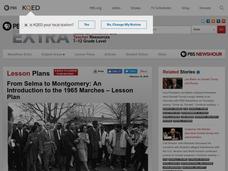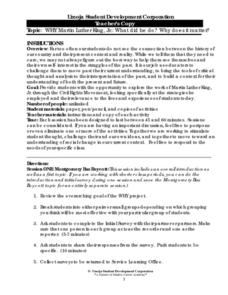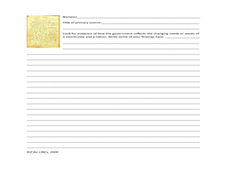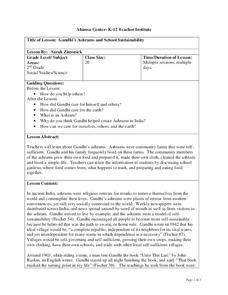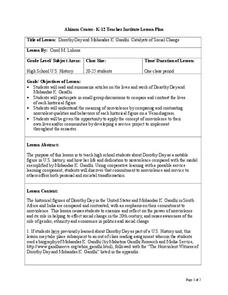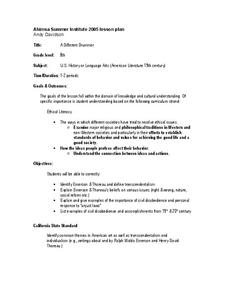PBS
From Selma to Montgomery: An Introduction to the 1965 Marches
The 1965 Civil Rights marches from Selma to Montgomery and the resulting Voting Rights Act of 1965 are the focus of a social studies lesson. The resource uses film clips to inform viewers not only about the discrimination that gave rise...
Curated OER
Concept Formation Lesson Plan: Understanding "Protest"
After analyzing both examples and non-examples of a variety of protests conducted by ethnic groups in Seattle and the state of Washington during the twentieth century, your class members will work to identify the key ideas and components...
K12 Reader
Glossary of Non-Violence
Make sure your class is sure of terminology when referring to the non-violent methods used in the civil rights movement. This glossary includes 19 terms paired with parts of speech and definitions.
Umoja Student Development Corporation
Martin Luther King, Jr.: What Did He Do? Why Does It Matter?
Young historians examine the work of Martin Luther King Jr. by reading and answering questions about the Montgomery Bus Boycott, the Albany Movement, the Birmingham and Chicago campaigns, and the Memphis Sanitation Worker's Strike.
Atlanta History Center
Civil Disobedience and the Atlanta Student Movement
What tactics are used in civil disobedience? Learners study the conditions in Alabama that led to the establishment of the Atlanta Student Movement, as well as consider the nature and effectiveness of civil disobedience.
Curated OER
Gandhi Speech Writing
Explore non-violent protest in this social values and world history lesson plan. After viewing the movie Gandhi, and discussing important events in Gandhi's life, young orators write a speech defending Gandhi's position on the value of...
Curated OER
Integrating Gandhian Principles of Communal Unity in Mathematics
Fourth through sixth graders incorporate Gandhian principles into Math curriculum. They explore Gandhi's teachings on communal unity and economic equality. This has quite a bit of information about Gandhi and his observations and...
Curated OER
Towards Separation of Church and State in Gloucester
Explore New England government in the 1700's with your class. They will identify historical documents as primary or secondary sources, then read and discuss the significance of these documents as they relate to the "freedom of religion"...
Curated OER
Gandhi's Ashrams and School Sustainability
Explore philosophy and religion by researching Gandhi. Lead your young students to investigate the life and accomplishments of Mahatma Gandhi by reading the assigned text. Your class will define sustainability and create a sustainable...
Curated OER
Take a Walk in Their Shoes: Great Leaders of Our Time
Research the characteristics of leaders who have used nonviolence to change society. The class then applies this information to their own community to find leaders with these same characteristics, creating a wall collage of pictures and...
Curated OER
The Indian Subcontinent Since 1947: The Legacy of Independence
An exploration of Indian and Pakistani cultures and conflicts throughout the 20th - 21st centuries, this presentation features relevant political cartoons and poignant photos to illustrate the breadth of politics in India and Pakistan....
Fu Jen Catholic University
Cry Freedom
If you are considering showing the film Cry Freedom, directed by Richard Attenborough, to your class, you might show them this presentation first. The slides contain background information about South Africa, apartheid, Steve Biko, and...
Curated OER
An Eye for an Eye
Young scholars watch a view introducing them to modern Indian History. During the film, they answer discussion quesitons and discover the concept of non-violent civil disobedience. They share their responses with the class and write an...
Curated OER
Unit on Gandhi and Ahimsa
Students explore the history of Gandhi and his viewpoint and example of nonviolence. In this World History lesson, students complete numerous research assignments and activities over the course of nine lessons to expand their knowledge...
Curated OER
Civil Disobedience
In this online interactive philosophy quiz learning exercise, students respond to 30 multiple choice questions about Thoreau's Civil Disobedience. Students may submit their answers to be scored.
Curated OER
Mohandas Gandhi
For this online interactive history quiz worksheet, students respond to 50 multiple choice questions about the accomplishments of Mohandas Gandhi. Students may submit their answers to be scored.
Curated OER
Civil Disobedience
In this online interactive literature worksheet, students respond to 10 short answer and essay questions about Henry David Thoreau's Civil Disobedience. Students may check some of their answers on the interactive worksheet.
Curated OER
Free India: Resisting British Rule in India
Students explore the impact of nonviolence during Gandhi's Free India movement. In this World History lesson, students complete several activities including research, class discussions and a multimedia project, all centered around Gandhi.
Curated OER
The Roots of Ahimsa
Students investigate the philosophy of nonviolence. In this Ghandi lesson, students discover that Gandhi inspired many civil rights leaders with the idea of ahimsa. Students complete venn diagrams, create timelines, and discuss reading...
Curated OER
Gandhi’s 12 Vows: Training Warriors of Non-violence
Learners examine Gandhi’s ‘Walk n Talk’ strategy. In this lesson on civil disobedience, students evaluate Gandhi’s non-violent method of satyagraha as an effective mode of revolution.
Curated OER
Dorothy Day and Mohandas K. Gandhi: Catalysts of Social Change
Students explore how Dorothy Day and Mohandas Gandhi were leaders for social change. In this history lesson plan, students analyze the impact of these two leaders through several activities and group assignments.
Curated OER
Truth and love by Ghandi and King: Experimenting with Satyagraha
Students research Ghandi's philosophy of Satyagraha. In this Satyagraha instructional activity, students see how Martin Luther King incorporated Ghandi's "truth-force" philosophy into the Black Freedom Movement. They see how this...
Curated OER
A Different Drummer
Eighth graders investigate philosophy and meditation techniques by discussing Emerson and Thoreau. In this philosophical traditions activity, 8th graders identify the men Ralph Waldo Emerson and Henry David Thoreau, their work, and...
Curated OER
Religion in Social Change: What's God Got To Do With It?
Students determine how religion influences social change. In this religion and social change instructional activity, students examine how the religious beliefs of Mohandas Gandhi and Martin Luther King, Jr. were inspirational as they...


